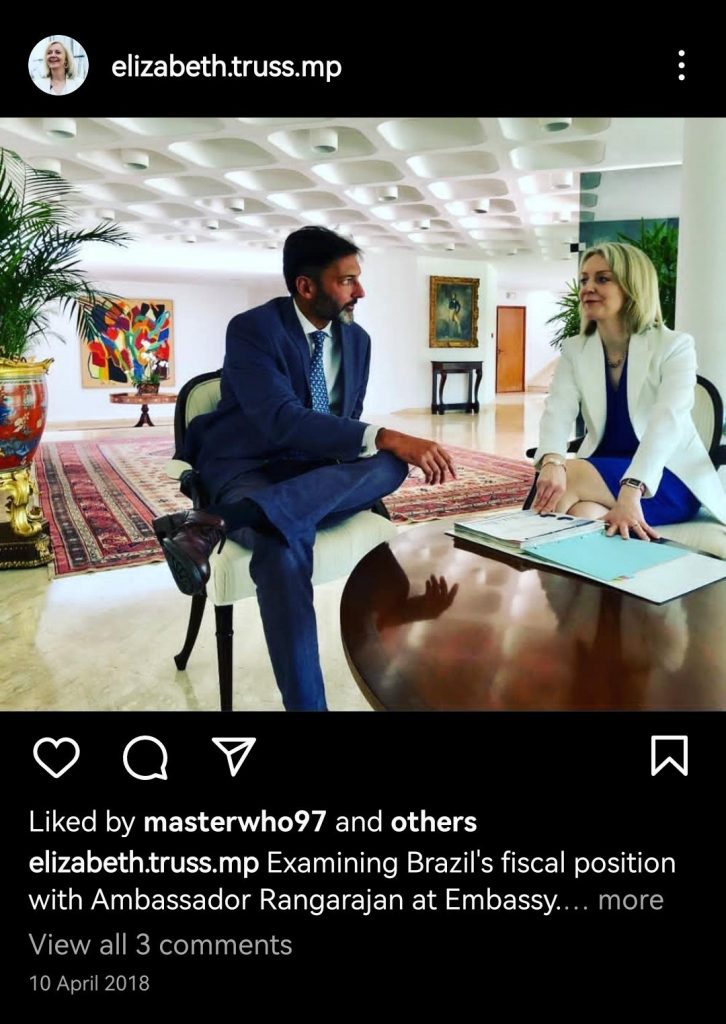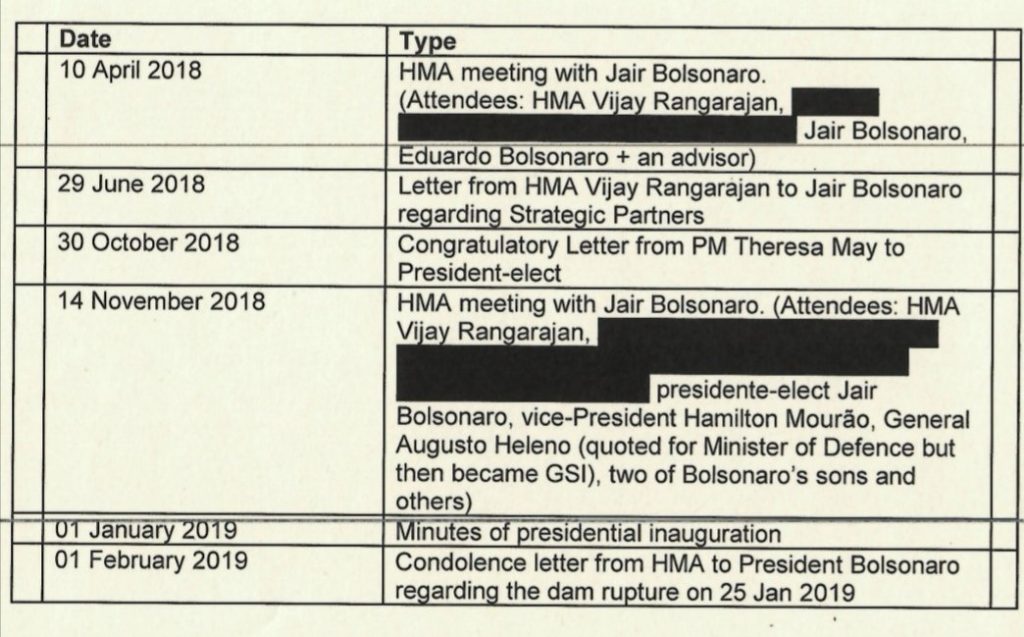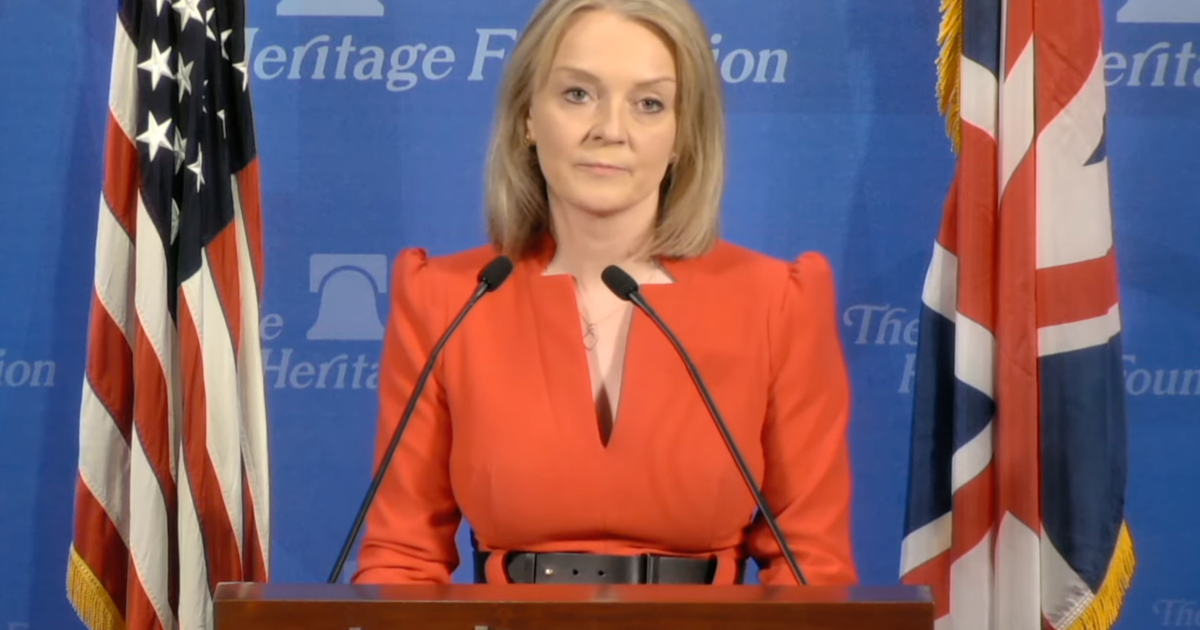Incoming British Prime Minister has been challenged in parliament over her proximity to far right Brazilian president Jair Bolsonaro. The questions are related to secret meetings held in 2018, six months before the neofascist was controversially elected following the arrest and jailing of frontrunner then and now, Lula da Silva.
One day after her confirmation as new UK Prime Minister, current Foreign Secretary Liz Truss faced questions in the House of Commons over her relationship with Brazil’s neofascist president Jair Bolsonaro.
Shadow Minister Fabian Hamilton of the Labour Party directly challenged Truss on her relationship with Bolsonaro: “Given that the Foreign Secretary, who is shortly to become Prime Minister, has spent so much time cosying up to President Bolsonaro, rather than challenging on the destruction of the Amazon rainforest and the attack on fundamental human rights in Brazil, will the Minister use her diplomatic pressure to help ensure these elections are able to be independently observed, with all sides respecting the outcome and result afterwards?”
Hamilton was referring to connections dating at back to early 2018. On April 9 that year, just a few days after electoral frontrunner Lula was jailed, then-Chief Secretary to the Treasury Liz Truss set off for Brazil on an official visit to promote “free markets, an open economy, and privatisation”. Truss met openly with the then post-coup government of Michel Temer, and posted photos of the discussion on social media at the time.
But it is another meeting, held in secret, which was bound to haunt Truss upon becoming Prime Minister.
Secret Meeting
On April 10, 2018, Truss posted on social media a photo taken with then UK Ambassador to Brazil Brazil Vijay Rangarajan. On the same day British diplomat Chetna Patel tweeted that she was “delighted” to be welcoming Truss to Brazil, tagging ambassador Rangarajan.
As reported by Brasilwire in 2020, a Foreign and Commonwealth Office meeting schedule, released via a freedom of Information request reveals that the same day Ambassador Rangarajan met with Jair Bolsonaro, his son, congressman Eduardo, and other advisors.
The document shows at least one name redacted, yet Truss and Rangarajan, it appears, were both together on the day of the ambassador’s meeting with the Bolsonaro campaign.
To clarify whether Truss attended the secret meeting with the Bolsonaros, investigative journalist John McEvoy of Declassified made a a further FOI request in August 2019, but the UK Government have yet to properly respond.
The Treasury have now been refusing to comply with FOIA statutory obligations about Truss’s meetings in Brazil for three years, and in breach of the rules, the issue has now been forwarded to the Information Commissioner.
The Foreign and Commonwealth Office’s contact with Bolsonaro dates back to 2014 or earlier, and Truss’s meeting is not the only instance of the UK Government reticence to reveal its relationship with the Bolsonaro-fronted, military dominated regime, and their path to power.
In 2020 Brasilwire reported that the UK Foreign and Commonwealth Office (FCO) had deleted records of its discussions with strategic communications companies SCL and Cambridge Analytica in Brazil. The information was revealed in two further Freedom of Information requests. The companies activities in Brazil where known yet almost all trace of records of the meetings between UK diplomats, Brazilian political actors, and Cambridge Analytica/SCL, whose behavioural psychology tools require Defence Ministry authorisation for foreign use, had been erased.
It is unclear if Truss and her team met any other 2018 presidential candidates, due to the UK Government’s refusal to comply with the freedom of information request about her activities in Brazil.


Strategic Partners
Truss held at least one other meeting, at ultraliberal Instituto Milenium, founded by Bolsonaro’s Economy Minister, “Chicago Boy” Paulo Guedes. Milenium is a partner of Britain’s own Adam Smith institute, an organisation acknowledged as an instrument of UK soft power in government documents, and part of the libertarian Atlas Network, which organised foreign funded campaigns for the overthrow of Dilma Rousseff, jailing of Lula, and Bolsonaro’s election.
UK firms participated directly in US-orchestrated Operation Lava Jato, which jailed Lula to keep him out of the 2018 election, which its head prosecutor called “a gift from the CIA“. The UK Government is also connected to Lava Jato via its funding of Transparency International, which has subsequently been found in connivance with Brazilian prosecutors for both political and financial ends.
A few months after the April 2018 meeting between UK representatives and the Bolsonaros, another took place.
A secret document obtained by Brasilwire reveals that the British government lobbied neo-fascist candidate Jair Bolsonaro on behalf of British pharmaceutical, oil and mining companies in the run-up to the 2018 presidential election.
In a private letter personally addressed to Bolsonaro on 29 June 2018, Vijay Rangarajan invites the presidential candidate to his own residence to meet a number of “Strategic Partners” in Brazil. Those partners included pharma multinational AstraZeneca, as well as extractive giants BP, Shell, and Anglo American.
Amongst the biggest beneficiaries in the shift to privatisation since the 2016 coup, an economic path deepened by Bolsonaro, are UK based Oil multinationals BP and Shell, whilst AstraZeneca was the first and only Covid-19 vaccine procured by the Bolsonaro government in 2020, despite it being unready for production.
Truss is a former Shell employee and BP has been a generous donor to her political career.
As for the destruction of the Amazon, Truss’s relationship with US climate denial lobby, powered by organisations such as Bolsonaro-allied Heritage foundation and libertarian Cato Institute, is well known, and through funders such as Koch, these entities are intrinsically linked to the Atlas Network, which did so much to interfere in Brazil’s domestic political climate between 2013 and 2018.
Questions in Parliament
In the House of Commons, Richard Burgon, the Labour MP for Leeds East quizzed Parliamentary Under-Secretary of State for Foreign, Commonwealth and Development Affairs Vicky Ford over “adequacy of election observation arrangements” for the imminent elections in Brazil, and pointed to , target violence, even fatal shootings of Workers Party members.
Burgon asked “Will the Government make a public statement ahead of next month’s vote that political violence and threats of coups have no place in this election?”
Ford acknowledged the assassination attempt of Argentinian Vice President Cristina Kirchner and tacitly acknowledged the threat surrounding the September 7 independence day celebrations: “Brazil celebrates the 200th anniversary of its independence and I congratulate the people of Brazil on that important milestone, but I also want to say that we all hope those celebrations are joyous and peaceful, because peace in elections is vital.”
Ford repeatedly emphasised “free and fair elections”, and claimed to have met “representatives of Brazil’s current Government and the Brazilian Workers’ party”.
A special UK Parliamentary motion was launched in July in defence of Brazilian democracy, following threats to the election process from far right president Jair Bolsonaro and his military dominated government. The initiative has attracted support from MPs from all the major parties, except the Conservative Party. No Tory MPs have signed the motion.
As Foreign Secretary, in September 2021, Truss and her colleagues welcomed Bolsonaro on a visit to London, despite the far right president already threatening Brazil’s constitution, and facing multiple charges of genocide and crimes against humanity at the International Criminal Court.
[qpp]

